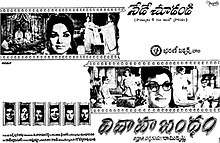Vivaha Bandham
| Vivaha Bandham | |
|---|---|
 Theatrical release poster | |
| Directed by | P. S. Ramakrishna Rao |
| Produced by | P. S. Ramakrishna Rao |
| Written by | A. Picheswara Rao (dialogues) |
| Screenplay by | P. S. Ramakrishna Rao |
| Story by | Ashutosh Mukherjee |
| Based on | Saat Pake Bandha (1963) |
| Starring |
N. T. Rama Rao Bhanumathi Ramakrishna |
| Music by |
M. B. Sreenivasan Bhanumathi Ramakrishna (Supervision) |
| Cinematography | Annayya |
| Edited by | M. V. Rajan |
Production company |
Bharani Pictures[1] |
| Distributed by | Navayuga Films |
Release date |
|
Running time | 140 mins |
| Country | India |
| Language | Telugu |
Vivaha Bandham (English: Marriage Relation) is a 1964 Telugu drama film, produced and directed by P. S. Ramakrishna Rao under the Bharani Pictures banner.[3][4] It stars N. T. Rama Rao and Bhanumathi Ramakrishna[5] in the lead roles, with music composed by M. B. Srinivasan, while Bhanumathi Ramakrishna has taken care of supervision.[6] The film is remake of Bengali Movie Saat Pake Bandha (1963).[7]
Plot
Bharathi (Bhanumathi Ramakrishna) is the daughter of retired principal Appa Rao (Chittor V. Nagaiah). She has good values with self-esteem and confidence. Lecturer Chandrashekar (N. T. Rama Rao) gets acquainted with her and they start loving each other. Bharathi’s mother Manikyamba (Suryakantham) does not like this alliance because of prestige. But Appa Rao convinces her and makes the marriage of Chandrashekar and Bharathi. After the marriage, Manikyamma always criticizes Chandrashekar, so, he leaves their house along with Bharathi and starts living happily. Manikyanba doesn’t like the middle-class life of her daughter. She starts boasting about her son-in-law to the relatives. Chandrashekar gets hurt by this, so, he doesn’t want to go again to her house and Bharathi is sandwiched between mother and husband. Then, step by step, ego clashes arise between the couple, both of them lose their tolerance and separate to take a divorce. In the climax, they understand that marriage is not uniting two human beings, but it is an act of uniting two souls. Finally, the movie ends on a happy note.
Cast
- N. T. Rama Rao as Chandra Shekar
- Bhanumathi Ramakrishna as Bharati
- Chittor V. Nagaiah as Principal Appa Rao
- Padmanabham as Kanta Rao
- M. Balaiah
- Haranath
- Prabhakar Reddy as Raghu
- Vangara
- Dr. Sivaramakrishnaiah
- Suryakantham as Manikyamba
- Hemalatha as Shantamma
- Vasanthi as Aruna
- Radha Kumari
Crew
- Art: Rajendra Kumar
- Choreography: Vempati
- Stills: Satyam
- Dialogues: A. Picheswara Rao
- Lyrics: C. Narayana Reddy
- Playback: P. B. Srinivas, Bhanumathi Ramakrishna
- Music: M. B. Srinivasan
- Story: Ashutosh Mukherjee
- Editing: M. V. Rajan
- Cinematography: Annayya
- Screenplay - Producer - Director: P. S. Ramakrishna Rao
- Banner: Bharani Pictures
- Release Date: 23 October 1964
Soundtrack
| Vivaha Bandham | |
|---|---|
| Film score by M. B. Srinivasan | |
| Released | 1964 |
| Genre | Soundtrack |
| Length | 21:21 |
| Producer | M. B. Srinivasan |
Music composed by M. B. Srinivasan. Lyrics were written by C. Narayana Reddy. Music released by Audio Company.[8]
| S. No. | Song Title | Singers | length |
|---|---|---|---|
| 1 | "Vinnava Aah Vinnava" | Bhanumathi Ramakrishna | 4:18 |
| 2 | "Neetilona Ningilona" | P. B. Srinivas, Bhanumathi Ramakrishna | 4:29 |
| 3 | "Nagumomu Ganaleni" | Bhanumathi Ramakrishna | 6:11 |
| 4 | "Alumagalu Vidipoyenanthane" | Bhanumathi Ramakrishna | 3:22 |
| 5 | "Neetilona Ningilona" (Sad) | P. B. Srinivas, Bhanumathi Ramakrishna | 3:01 |
References
- ↑ "Vivaha Bandham (Overview)". IMDb.
- ↑ "Vivaha Bandham (Release Date)". Spicy Onion.
- ↑ "Vivaha Bandham (Banner)". Chitr.com.
- ↑ "Vivaha Bandham (Direction)". Filmiclub.
- ↑ "Vivaha Bandham (Cast & Crew)". gomolo.com.
- ↑ "Vivaha Bandham (Preview)". Filmiclub.
- ↑ "Vivaha Bandham (Review)". The Cine Bay.
- ↑ "Vivaha Bandham (Songs)". Cineradham.